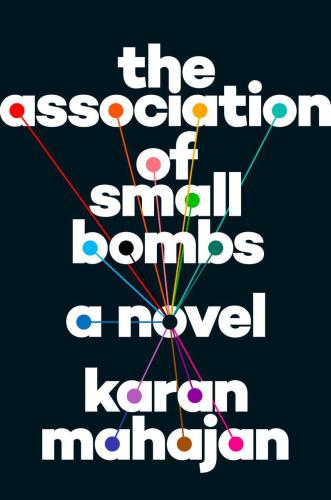
The Association of Small Bombs
A Novel
فرمت کتاب
ebook
تاریخ انتشار
2016
Lexile Score
990
Reading Level
5-7
نویسنده
Karan Mahajanشابک
9780698407060
کتاب های مرتبط
- اطلاعات
- نقد و بررسی
- دیدگاه کاربران
نقد و بررسی

January 25, 2016
The disintegration of the lives of both Hindus and Muslims affected by a bomb blast at Lajpat Market in Delhi in 1996 is the subject of Mahajan’s second novel (after Family Planning). In the aftermath of the violence we follow not only a Muslim boy who survives, Mansoor Ahmed, but his parents; the Hindu parents of Mansoor’s two friends killed in the blast; the bomb maker, named “Shockie”; and several activists who seek justice after the tragedy. The lives of Mansoor’s parents and the dead brothers’ mother and father unravel, their careers and marriages frayed by grief and anxiety. Mansoor tries to concentrate on his studies in the States, but returns to India and falls in with a charismatic activist called Ayub, soon to be unhinged by a breakup with his upper-class girlfriend. Mahajan’s talent is in conveying the sense that the world is gray, not black-and-white, and he accomplishes this by weaving together the evolving motives and passions of his characters so intricately that in the end we see each as culpable, and human. In his searing story, lives (and life itself) are subjected to close inspection and at times discombobulation.

January 1, 2016
A terrorist bombing in Delhi powers this exploration of radicalization, politics, and religion. The second novel by Mahajan (Family Planning, 2008) turns on two families transformed by a 1996 explosion in an open-air market. The Khuranas, who are Hindu, lost two young sons in the blast, while the neighboring Ahmeds, who are Muslim, nearly lost their son, Mansoor. Though Mansoor was not religious growing up, he still absorbs the prejudices of Indians and, later, the Americans he meets as a college student in the United States. He survived the bombing but suffered wrist injuries that make it all but impossible for him to pursue a career as a programmer. From such frustrations, Mahajan suggests, are the seeds of terrorism sown. (Sexual repression and unrequited love play no small roles, too.) Though Mansoor is the focus, Mahajan ably shifts the point of view to the killed boys' father, Vikas, who tries to channel his mourning into a documentary; Shockie, the bomb maker worn down by his job; and Ayub, a Muslim activist whose nonviolent sympathies slowly erode. Mahajan's effort to make a thriller out of the story, climaxing in another bombing attempt, can feel pat--he oversells the point that radicalism makes for unlikely bedfellows. But he's strong at exploring the very long shockwaves of small-scale violence: though the market bombings in India don't kill as many as 9/11, Mahajan argues that they have a more devastating cruelty for upending lives to no useful political purpose. Small bombs "concentrate the pain on the lives of a few," one radical says. "Better to kill generously." The wrong conclusion, of course, but the novel shows how some arrive at such callous postures. An engaging if plot-thick novel that's alert to the intersection of the emotional and political.
COPYRIGHT(2016) Kirkus Reviews, ALL RIGHTS RESERVED.

July 1, 2016
Just as the author describes a market in Delhi, this novel "begins everywhere at once." Readers are immediately thrown into urban India, piecing together the important players of this drama. Mahajan begins the novel by describing a singular, almost routine event of 1996: a car bomb in a crowded Delhi marketplace. In the years that follow, the lives of a survivor, the family of two deceased boys, and the bombers themselves become intertwined. For the most part, the story takes place in India, and readers could easily become bogged down with unfamiliar terminology in the first third of the book. However, the narrative begins to pick up speed when Mansoor, the bomb survivor and a Muslim, leaves India to pursue his education in the United States. He returns to his homeland because of medical concerns complicated by his injuries from the bombing. Teens will be interested in the change Mansoor undergoes after his return to Dehli and intrigued by the human side of both the bombers and those affected by this act of violence. VERDICT Purchase where there is a demand for titles set in India or an interest in antiheroes.-Krystina Kelley, Belle Valley School, Belleville, IL
Copyright 2016 School Library Journal, LLC Used with permission.

March 1, 2016
In the virtuosic opening of Mahajan's (Family Planning, 2008) timely second novel, he writes, a good bombing begins everywhere at once. This setup works well for the broad array of story lines connected to a 1996 detonation of a small but potent bomb in a humble Delhi marketplace. Two young Hindu brothers perish in the blast, but their best friend, Mansoor, a Muslim schoolmate, survives with injuries. The novel traverses continents and yearsup to the trial in 2003, even allowing a grieving character to inhabit the bomb in a spectacular dream. The anchoring characters are Mansoor and Shockie, a Kashmiri bomb maker who refers to his deadly art as making chocolate, even as he worries about his victims and his ill mother. Mahajan's terrorists and social activists are never content to settle into one venue or mindset. At times the novel becomes too restless, and it can be challenging to trace the origins of certain characters' epiphanies or disillusionment. Brief moments of reunion, however, go a long way toward deciphering the connections in the fallout of endless emotional shrapnel.(Reprinted with permission of Booklist, copyright 2016, American Library Association.)

























دیدگاه کاربران